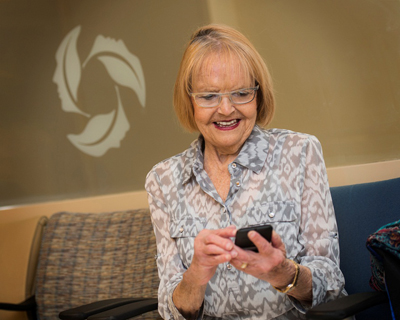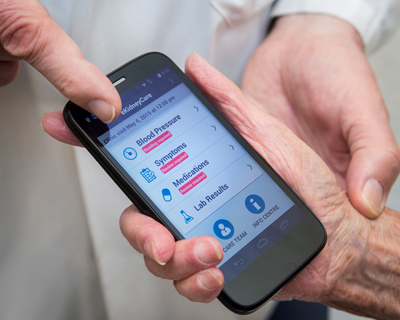eKidneyCare mobile app is the brainchild of Toronto General Hospital’s Division of Nephrology Strategic Action Group. (Video: Division of Nephrology)
They say it's a mobile app that does it all. Named eKidneyCare, the app can record your blood pressure, manage medication use, track your symptoms, and send back your lab results.
For 77-year-old Vivian Rosenberg, it was that sense of reassurance that drew her to the app.
"It makes you feel like someone is always looking out for you," she says.
In 2005, Vivian had a double lung transplant at Toronto General Hospital and developed kidney disease afterwards.
A mobile self-management support tool
The mobile app is the brainchild of Toronto General Hospital's Division of Nephrology Strategic Action Group consisting of Dr. Judith Miller, former Director of Division of Nephrology; Dr. Alexander Logan, staff nephrologist; Dr. S. Vanita Jassal, staff nephrologist; Stephanie Ong, clinical pharmacist; and Eveline Porter, nurse.
The team sees the app as a mobile self-management support tool that enables patients to collaborate with their care team, providing an easier way to manage their chronic kidney disease while empowering them to engage in healthy behaviours. Dr. Christopher C. Chan, the current Director of the Division of Nephrology, is an enthusiastic supporter of this divisional initiative.
'Patients were knocking on my door to participate in the pilot project'
After wrapping up the pilot project for the app, the Strategic Action Group presented their preliminary results at the National e-Health conference in June 2015.
Pilot results were all positive -- better blood pressure control, medication adherence, and an overall decrease in medication errors for patients with chronic kidney disease. The pilot study involved 47 patients, nine doctors, three nurses and three pharmacists who tested the app over a 6-month period.
"I've done a lot of research projects in the past and the patient involvement with this one is quite unique… we had to put patients on a waiting list, and even then, they were knocking at my door asking to participate," says Dr. Logan, who is also the Strategic Action Group lead.

Vivian Rosenberg, one of the patients who volunteered to participate in the pilot study, demonstrates how she uses the eKidneyCare app. (Photo: UHN Photographics)
For Dr. Logan, the eKidneyCare app was so popular that it was the first time he witnessed patients asking to volunteer for a pilot project.
How it works
What is unique about eKidneyCare, he explains, is that it packages several features together and provides immediate feedback support – whereas most current apps only provide standalone features and no personalized messaging.
"As a consequence of having chronic disease, the treatment process [for these patients] is also complex and being delivered by multiple specialists," says Dr. Logan.
eKidneyCare also produces email alerts to the patient's health-care team, which may include doctors, nurses, and pharmacists, if any of the patient's symptoms become critical. Patients receive prompts reminding them to complete various tasks, such as take their blood pressure or update their medication profile. If they reach a critical threshold, such as higher than normal blood pressure readings, they may be prompted to make an appointment with their physician.
Dr. Kainat Shahid, nephrologist at UHN, was among the nine doctors who participated in the pilot study. She is eager to see the app go public.
"I feel it empowers our patients and gives them a sense of control over their disease," she says. "It is also a useful tool to take to other physicians or clinics as it gives a good summary of their medications and recent lab values."
Patients with complex disease often see a number of doctors for various health conditions. Dr. Shahid found the app was extremely helpful in identifying potentially harmful medications and dose adjustments.
"I had one patient who started on an anti-inflammatory medication that can be harmful in chronic kidney disease patients," she says. "We were able to quickly intervene and ask the patient to stop the medication and provide an appropriate alternative. Critical lab result alerts such as potassium and low hemoglobin were also very useful to enable quick intervention without delays."
'The best possible thing'
As part of the pilot project, each volunteer patient received a blue-tooth enabled blood pressure monitoring device and a mobile phone that has eKidneyCare already downloaded onto it.

The eKidneyCare app tracks blood pressure results, symptoms, medication use, and lab results. The essence of the app is to help patients become better partners in care. (Photo: UHN Photographics)
For 81-year-old Brian Brooks, it was the first mobile phone he had ever used. During his visit to the clinic, he pulls out a three-inch file of loose leaf papers – test charts and daily medication logs that he used to carry to every appointment, he says.
"So this was replaced with the phone," remarks Brian as he drops the file onto the table with a "thump."
Brian says the eKidneyCare app has been "the best possible thing" remarking that it is not only easy to carry around but great for showing his care team.
"For an update on my condition, I can just show my family doctor my phone," he says, swiping the screen which reveals a line graph indicating his blood pressure levels over the last six months. Brian echoes similar sentiments to Vivian -- both have found the app has made them more aware about their overall health and diet.
"When I started [using the app], I might have had a glass of wine a day, but now I have a glass of wine every second or third day. It makes you much more aware of keeping yourself healthy if you can," he says. Vivian has become cautious of foods high in salt and potassium and tries to exercise more regularly.
The future of eKidneyCare
The Strategic Action Group plans to create a website that will deliver patient-enabled tools that feature aspects of the eKidneyCare app.
"Though the pilot study has given us positive results," says Stephanie Ong, the Strategic Action Group's clinical project lead, "to fully test out the impact on overall health and health care delivery, we really need to put the app through a rigorous clinical trial for a longer duration and with more patients."
The eKidneyCare app is not available to the public yet. The team's ultimate goal includes a direct download of the app from Google Play or iTunes in the near future.
The pilot study for the mobile app was made possible through support from the Fast Foundation, Ontario Renal Network, and the Ministry of Health and Long-term Care Alternative Funding Program.
